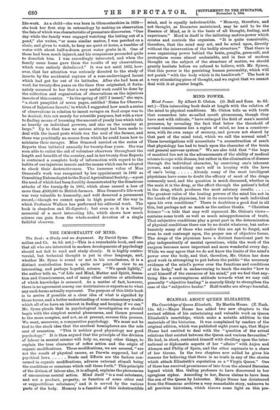Mind Power. By Albert B. Olsten. (G. Bell and Sons.
4s. 6d.. net.)—This interesting book deals at length with the relation of the mind to physical conditions. Mr. Olston tells us with truth that researches into so-called occult phenomena, though they have met with ridicule, "have enlarged the field of man's mental processes, by revealing the fact that below the threshold of normal consciousness lies a region of mind, no less a conscious- ness, with its own range of memory, and powers not shared by that part of the mind total, which we call the normal mind." These investigations will necessitate "a reconstruction of much that physiology has had to teach upon the character of the brain and general nervous system." We are also told that "the hope of mankind lies not in the advancements of the ability of medical science to cope with disease, but rather in the elimination of disease through the individual character, by exercising one's inherent powers, and conducting one's self in keeping with the laws
of one's being Already many of the most intelligent physicians have come to doubt the efficacy of most of the drugs commonly used, and the question is much discussed, whether in the main it is the drug, or the effect through the patient's belief
in the drug, which produces the most salutary results The greatest value of the healing powers of the mind lies not in the hands of the physician, but in its exercise by each individual upon his own conditions." There is doubtless a good deal in all this, but perhaps not so much as the author thinks. "Christian Science "—a title that may well represent Mr. Olston's views— contains some truth as well as much misapprehension of truth. That subjective conditions play a great part in the determination, of physical conditions there can be no doubt whatever, but unfor- tunately many of those who realise this are apt to forget, and even to cast contempt upon, the proper use of objective forces. The drugs of the physician have a distinct functional part to, play independently of mental operations, while the work of the surgeon becomes more important and more wonderful every day. While we may agree that we do not know the limits of the mind's power over the body, and that, therefore, Mr. Olston has done good work in attempting to put before the public "the necessary evidence of the mind's power over the functions and conditions of the body," and in endeavouring to teach the reader "how to avail himself of the resources of his mind," yet we feel that any- thing like a contemptuous attitude towards what we may call generally "objective healing" is scarcely likely to strengthen the case of the "subjective healer." Half-truths are always harmful.


























































 Previous page
Previous page